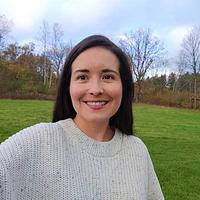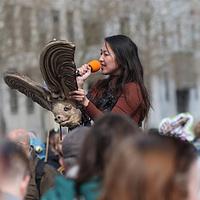Even though indigenous people represent only 5% of world’s population, they protect 80% of global biodiversity. Even though we Galapagos people are not indigenous people, like Māori people in New Zealand or Hawaiian people in Hawaii, we self-consider ourselves islanders as we have been fighting for our nature and human rights. And that is why I am joining today, on behalf of nature and people.
I also would like to mention that I did not come all the way from Galapagos for this event. I live here in Denmark four years, where I try to integrate myself into the Danish society, by learning its language, its history, and its culture. We moved here to live in Denmark with my Danish man, as we thought Denmark was a sustainable country. We were very proud about it and about raising our kids with a fantastic education and welfare system.
However, when we are critical thinkers as we were encouraged in my family -With my parents supporting different organizations on environmental and human rights, we also have the responsibility to act. For that, even though I promised myself that I would not be protesting anymore as I used to when I was younger, I am standing here in front of the Danish Parliament because we need talk about the importance to be transparent and ethical.
We are a country in Denmark, that we talk a lot about trust, but we also need to be critical thinkers and ask information and transparency to our government. The same way about the “Hygge” concept, which I have read about it to try to decodify what means it. Apparently, “Hygge” is this feeling of familiarity, safety, and comfort. But hold on a second, and that is also why I am here today, if that “Hygge” lifestyle is upon the rights of Mother Nature in the Amazon or other countries in our South that is not “Hyggeligt” at all. We can still be “Hyggeligt” by consuming as back in the olds days – using local and fresh products just like the new Nordic cuisine promotes now - which is fantastic!
In addition, let’s also stop using that much unnecessary single-use plastic just because we have an incinerating plant burning everything. Staying in our comfort zone by sorting the trash is the easiest action but that is not a problem’s solution. Instead, changing our lifestyles and our habits, that is the most difficult thing. Sometimes I have seen people protesting in Folkets Klimamarch drinking in single-use plastic containers. On the other hand, in Galapagos we can see sea turtles entangled with fishing nets or the sea lions affected by plastic trash. Remember, everything is connected, so, even if in Copenhagen we cannot see the direct impact on wildlife here in our harbors, that impact affects the wildlife in another side in our places.
About the Amazon, I have here some facts. The Amazon holds 10% of the global biodiversity and provides us with 20% of the oxygen of our planet – that includes Denmark of course. However, we are planting soy there because it is cheaper instead of buying it to the United States, which is also producing soybeans. In terms of numbers, let me share with you, Danish Crown is one of the largest exporters and recipients of pork, owning 9.000 farmers producing and delivering many millions of pigs per year. 90% of Danish pigs are exported to over 120 countries. Pork exportation represents approximately up to 5% of Denmark’s’ total exportations. Last fact about this, from the Observatory of Economic Complexity (OEC), pigs represented 3.19 billion dollars. So, the numbers are big!
Just to finish, about the “Hygge” aspect - we all love it as well as we all love to trust our government, but we also can be critical thinkers. So, let’s think not only about Denmark, please, think also about other countries. I think Denmark is an innovative, progressive, and beautiful country but we also need to think that not everything is about Denmark. I mean, we also live in the global South. There are, indeed, amazing people living here contributing to our diversity here in Denmark, so maybe we can start learning to be open and listen to each other’s. Because that would be fantastic, and we would obtain very positive results to every nation if we would do that.
Very last fact. In many cities (this is a fact from Mexico City), kids know about many different brands of cars and telephones, computers, and tv channels but know barely know about our own endemic or native birds or biodiversity in the local areas within the cities. Remember these facts, and hopefully we can co-work together within regions. Thank you so much.
I also would like to mention that I did not come all the way from Galapagos for this event. I live here in Denmark four years, where I try to integrate myself into the Danish society, by learning its language, its history, and its culture. We moved here to live in Denmark with my Danish man, as we thought Denmark was a sustainable country. We were very proud about it and about raising our kids with a fantastic education and welfare system.
However, when we are critical thinkers as we were encouraged in my family -With my parents supporting different organizations on environmental and human rights, we also have the responsibility to act. For that, even though I promised myself that I would not be protesting anymore as I used to when I was younger, I am standing here in front of the Danish Parliament because we need talk about the importance to be transparent and ethical.
We are a country in Denmark, that we talk a lot about trust, but we also need to be critical thinkers and ask information and transparency to our government. The same way about the “Hygge” concept, which I have read about it to try to decodify what means it. Apparently, “Hygge” is this feeling of familiarity, safety, and comfort. But hold on a second, and that is also why I am here today, if that “Hygge” lifestyle is upon the rights of Mother Nature in the Amazon or other countries in our South that is not “Hyggeligt” at all. We can still be “Hyggeligt” by consuming as back in the olds days – using local and fresh products just like the new Nordic cuisine promotes now - which is fantastic!
In addition, let’s also stop using that much unnecessary single-use plastic just because we have an incinerating plant burning everything. Staying in our comfort zone by sorting the trash is the easiest action but that is not a problem’s solution. Instead, changing our lifestyles and our habits, that is the most difficult thing. Sometimes I have seen people protesting in Folkets Klimamarch drinking in single-use plastic containers. On the other hand, in Galapagos we can see sea turtles entangled with fishing nets or the sea lions affected by plastic trash. Remember, everything is connected, so, even if in Copenhagen we cannot see the direct impact on wildlife here in our harbors, that impact affects the wildlife in another side in our places.
About the Amazon, I have here some facts. The Amazon holds 10% of the global biodiversity and provides us with 20% of the oxygen of our planet – that includes Denmark of course. However, we are planting soy there because it is cheaper instead of buying it to the United States, which is also producing soybeans. In terms of numbers, let me share with you, Danish Crown is one of the largest exporters and recipients of pork, owning 9.000 farmers producing and delivering many millions of pigs per year. 90% of Danish pigs are exported to over 120 countries. Pork exportation represents approximately up to 5% of Denmark’s’ total exportations. Last fact about this, from the Observatory of Economic Complexity (OEC), pigs represented 3.19 billion dollars. So, the numbers are big!
Just to finish, about the “Hygge” aspect - we all love it as well as we all love to trust our government, but we also can be critical thinkers. So, let’s think not only about Denmark, please, think also about other countries. I think Denmark is an innovative, progressive, and beautiful country but we also need to think that not everything is about Denmark. I mean, we also live in the global South. There are, indeed, amazing people living here contributing to our diversity here in Denmark, so maybe we can start learning to be open and listen to each other’s. Because that would be fantastic, and we would obtain very positive results to every nation if we would do that.
Very last fact. In many cities (this is a fact from Mexico City), kids know about many different brands of cars and telephones, computers, and tv channels but know barely know about our own endemic or native birds or biodiversity in the local areas within the cities. Remember these facts, and hopefully we can co-work together within regions. Thank you so much.



